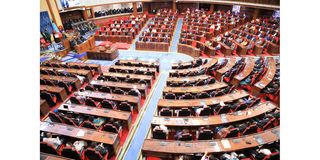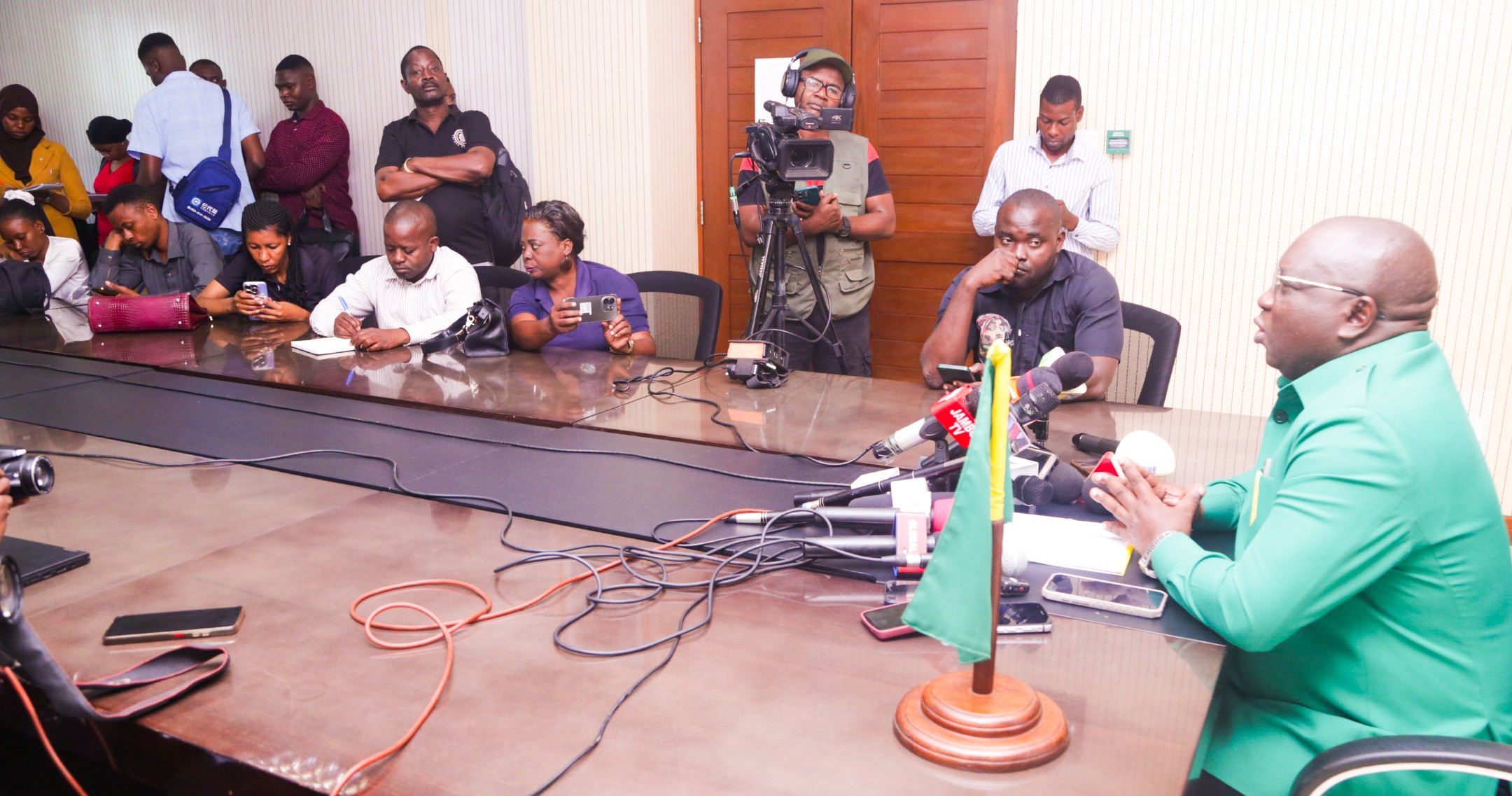Prime
Why ‘everyone’ wants a seat in Tanzania’s parliament

What you need to know:
- What was once a political battleground for ideologues has now become a coveted destination for individuals from all walks of professional life. And while public service remains the official justification for most aspirants, analysts and retired politicians argue that the motivation increasingly lies in the economic, social, and political benefits attached to the position.
Dar es Salaam. With the 2025 General Election approaching, Tanzania is witnessing an unprecedented rush for parliamentary seats. From seasoned technocrats, businesspeople and regional commissioners to academics and celebrities, the number of aspirants eyeing a place in the August House continues to grow.
What was once a political battleground for ideologues has now become a coveted destination for individuals from all walks of professional life. And while public service remains the official justification for most aspirants, analysts and retired politicians argue that the motivation increasingly lies in the economic, social, and political benefits attached to the position.
Beyond ideology: the appeal of power and perks
While the role of an MP includes legislative duties, representing constituents and contributing to national development, it is the financial rewards, access to influence and job security that have emerged as key incentives for many aspirants.
MPs in Tanzania are among the best-remunerated public officials. In addition to a modest monthly salary, they receive a variety of allowances, including for seating, constituency facilitation, housing, communication, travel, and fuel. The cumulative monthly package, though not officially disclosed, is considered generous by Tanzanian standards.
Moreover, at the end of a five-year term, MPs are entitled to a lump-sum gratuity estimated at between Sh250 million and Sh500 million. Combined with other allowances, a single term in Parliament could fetch an MP close to Sh1 billion. Few professionals or civil servants can hope to earn such a figure in the same period.
Yet, the financial package is only part of the appeal. “The job of an MP doesn’t have strict oversight. There is no clocking in or out, no direct line manager. You can attend to personal business and still be considered active,” said retired Prime Minister Frederick Sumaye in a past interview. He added that MPs enjoy privileges that even top administrators such as regional or district commissioners do not.
The status of an MP brings not only financial rewards but also a social standing that often surpasses that of professionals in academia, civil service or the private sector. MPs enjoy a significant media presence and their activities regularly make headlines, increasing their visibility and influence in public discourse.
This level of exposure is attractive to those seeking a public profile that could boost their future political or business ambitions.
Security of tenure versus presidential appointments
Presidential appointees like regional and district commissioners may enjoy respect and certain privileges, but they serve at the pleasure of the President and can be removed at any time. Their access to additional financial benefits is limited, as most perks are tied strictly to official duties.
Retired MP Selemani Bungara, popularly known as "Bwege," believes the status, immunity and visibility that come with being an MP make it an attractive career move. “You become someone important overnight. People approach you differently. You are seen, heard and respected,” he said.
Analysts note that for many outgoing administrators, the Parliament offers a softer landing into public life. It allows them to maintain public visibility without the operational burdens that come with executive appointments. Among those taking this path are former Tanzania Railways Corporation director general Masanja Kadogosa, former Arusha RC Paul Makonda, and ex-Mbeya RC Juma Homera.
Others in similar administrative roles are reportedly considering shifting into politics as a way of extending their public careers beyond appointments that are tied to political goodwill and executive discretion. With a parliamentary seat, they gain not just security but also access to influence decisions at national level, including budget allocations, infrastructure priorities and legislative reforms.
Academics, celebrities and businesspeople join the race
Parliament is no longer the exclusive realm of politicians. A growing number of academics, entertainers, media personalities and entrepreneurs are also entering the political arena. Their motivations vary.
For academics and technocrats, Parliament offers a chance to influence policy directly. Many lecturers and researchers view a parliamentary seat as a platform to translate ideas into law and gain influence in shaping the country’s future.
Businesspeople are attracted by the access Parliament offers to decision-makers. Being in the House gives them proximity to key policymakers, including the President and Prime Minister, which can be advantageous for advancing business interests.
“A photo with the President can elevate your standing in the business world, both locally and internationally,” said a businessman who preferred anonymity. “Being an MP is one of the surest ways to gain such access.”
Celebrities and influencers, on the other hand, see the Parliament as a stage for expanding their personal brands, achieving national recognition, and gaining control over their public image.
Ms Helena Swai, a political scientist at the University of Dar es Salaam, says the Parliament now offers a form of social validation. “For celebrities, it brings credibility. For intellectuals, it gives an opportunity to influence national discourse. The question is no longer whether you can serve, but what being in the Parliament does for your status,” she said. For some aspiring politicians, especially among the youth, the House represents a pathway to leadership and an opportunity to influence the national agenda on issues such as climate change, digital innovation, job creation, and education reform. Young aspirants increasingly frame their campaigns around transforming outdated laws and advocating for more inclusive development strategies.
Concerns over quality and representation
While the growing interest in parliamentary seats reflects a maturing democracy, it also raises concerns. Critics argue that the scramble for seats is diluting the quality of representation in the House.
“We are seeing a Parliament that risks becoming a club for benefit seekers rather than a chamber of people’s representatives,” said political analyst Dr Gideon Mpangala. “When people run for office motivated primarily by perks, the outcome is compromised legislative integrity.”
The professional drain is another issue. As experts from sectors like health, education, and infrastructure leave their technical posts for politics, institutions are weakened. Continuity is lost, and long-term reform efforts are disrupted.
Public frustration is also growing. With many Tanzanians struggling with high living costs and limited public services, the benefits enjoyed by MPs are seen as excessive. “Why should an MP receive Sh10 million for fuel while doctors in rural clinics lack basic equipment?” asked Rehema Njau, a youth activist in Mwanza.
Additionally, civil society groups are calling for electoral reforms that would ensure greater transparency in candidate nominations, limit campaign financing abuses, and strengthen voter education. These reforms, they argue, would help restore integrity in parliamentary contests and shift focus from personal gains to genuine public service.
Time for reform and reflection
As the 2025 General Election draws nearer and nomination races heat up, analysts say the country must have an honest conversation about the role and structure of Parliament. Suggestions include reviewing MPs' benefits, introducing performance metrics, and investing more in civic education to help voters make informed choices.
“If we want Parliament to serve its intended purpose, we need to ensure people are elected based on competence and vision, not connections or popularity,” said Ms Swai.
For now, the allure of Parliament remains strong. And unless structural reforms are made, the August House will continue to attract not just public servants, but also career opportunists seeking the rewards and recognition that come with the title 'MP'.





